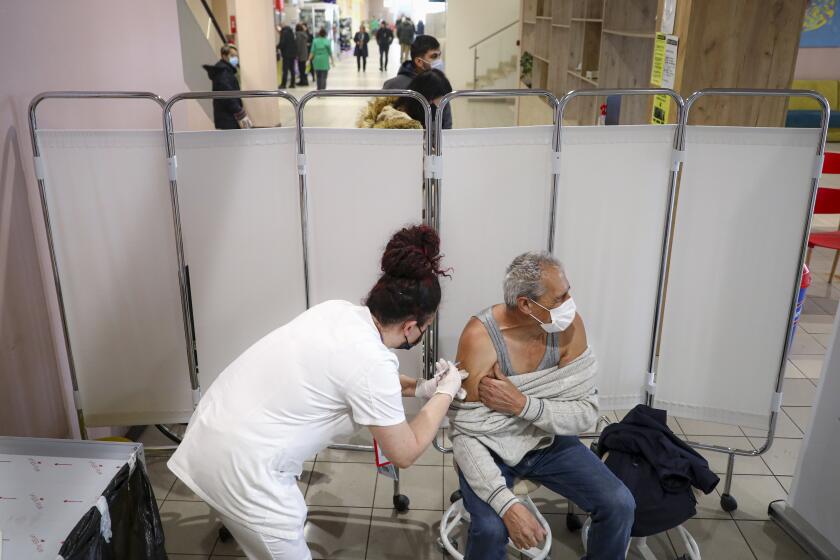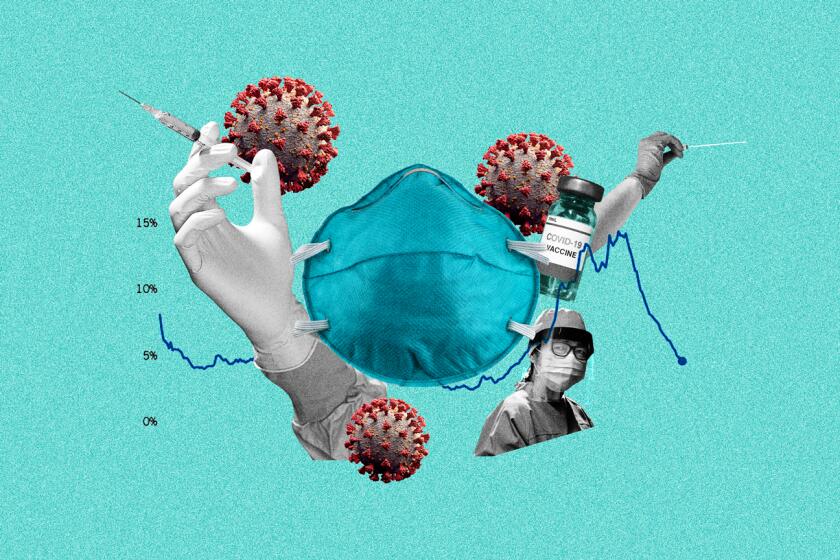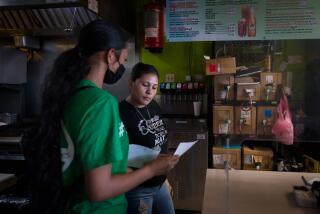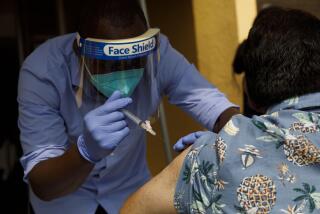Armenian American groups fight distrust, disinformation to encourage COVID-19 shots
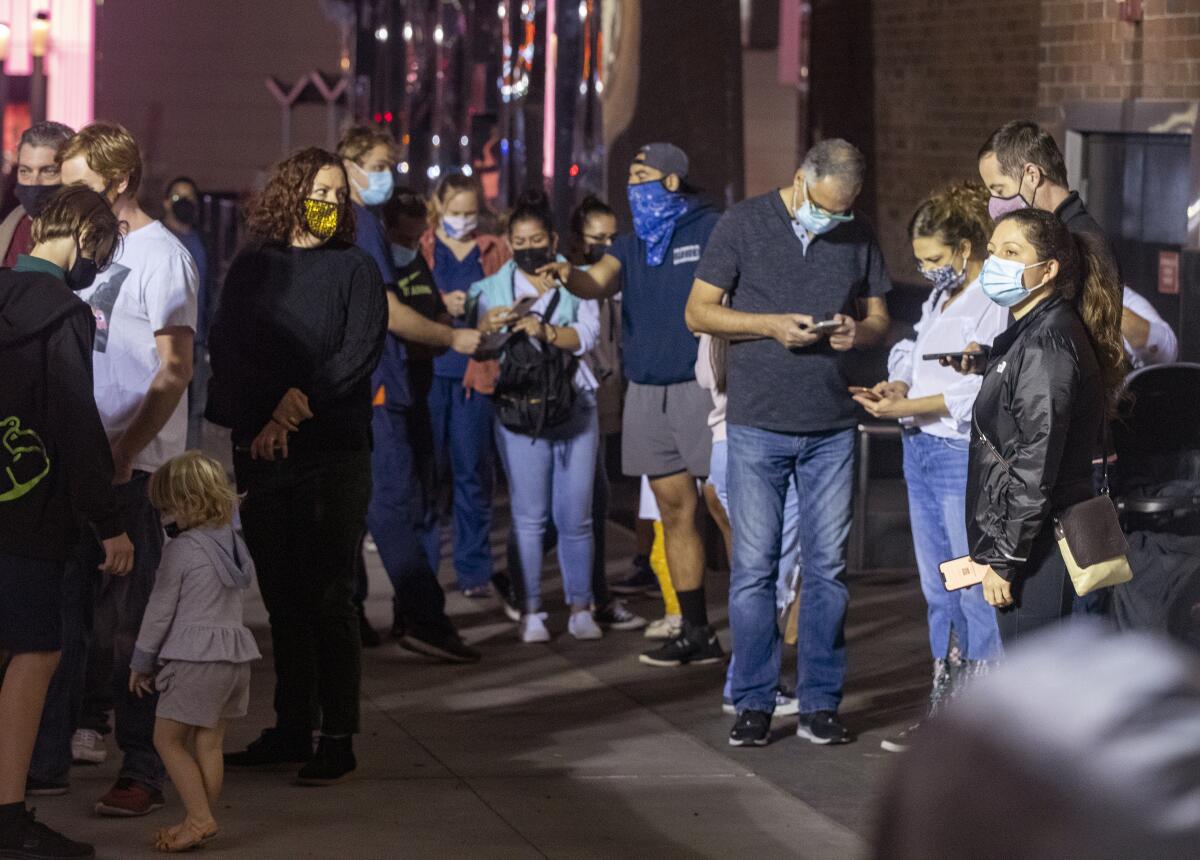
In Armenia, it is estimated that less than a quarter of residents had gotten vaccinated against COVID-19 as of mid-December, even as the country has drawn vaccine tourists.
The numbers are not nearly as stark in Glendale and Los Angeles neighborhoods such as Little Armenia, Thai Town and Sunland-Tujunga — areas that are hubs for one of the biggest populations of Armenians outside Armenia.
But they have lagged behind the Los Angeles County average, troubling some community leaders and physicians who fear that enduring distrust of government — stemming from genocide, upheaval and a precarious history in other countries — has made it harder to sway some Armenian Americans to get the shots.
For immigrants from the former Soviet Union, “there wasn’t any trust or credibility toward government,” said Assemblyman Adrin Nazarian (D-North Hollywood). Other Armenians who came from countries including Iran, Lebanon and Syria, he said, had faced “civil wars, internal strife, fear of retribution.”
All of that has fostered “a lot of concern towards just blanketly accepting what government is telling them,” Nazarian said.
It is unclear whether vaccine hesitancy or refusal is more pronounced among Armenian Americans than any other group in L.A. County, since public health officials do not track them as a group. But Nazarian called attention to the numbers in areas like Little Armenia, where only 56.6% of eligible residents were fully vaccinated as of mid-December, compared with 70% countywide.
In Glendale, where more than a third of residents are estimated to be of Armenian descent, the vaccination rate was 62.1%
Vic Keossian said that in Glendale parks, she has heard elderly men playing chess repeat the same doubts that have dogged public health outreach all over the county. “They have all this distrust in the vaccine,” Keossian said.
Some former vaccine skeptics in Eastern Europe have shifted over to the other side as infections surge and authorities battle against disinformation.
And false claims about the shots causing infertility have had a particular resonance in her community, she said, because of the trauma reverberating through its history.
“Armenians just have a different connection, I think, to fertility after going through genocide,” said Keossian, who works for the Armenian Relief Society of Western USA as program supervisor for a county COVID-19 community equity fund. “It’s something that’s really ingrained in us.”
Vaccination rates have been extremely low in Armenia itself. In early November, only 12% of adults there were fully vaccinated against COVID-19, according to a presentation by the country’s health ministry. The numbers have ticked up significantly since then, reaching an estimated 32% of Armenian adults as of mid-December, but have remained lower than in neighboring countries, according to statistics tracked by Our World in Data.
Even before the COVID-19 pandemic, Armenians had lower levels of confidence in vaccines than most of the European region, according to a study published in the Lancet. Armenian American Medical Society board member Dr. Vicken Sepilian said that in Armenia, such attitudes had been exacerbated by problems with the AstraZeneca vaccine rollout.
For people who rely heavily on news and social media from Armenia, “all of this has trickled down to our Armenian communities here,” Sepilian said.
In the U.S., “you’re seeing this among the people who have the most direct links to Armenia,” said Armine Lulejian, a clinical assistant professor of population and public health sciences at the Keck School of Medicine of USC.Among Armenian Americans who have emigrated from Armenia, “they have this backlash against anything ‘Big Brother’-ly since the collapse of the Soviet Union. If the government is saying it, they’re against it.”
Eric Hacopian, a political consultant for L.A. candidates who is currently residing in Armenia, also faulted “a feeder loop of misinformation” that can be especially potent among immigrants coming from the former Soviet Union or much of the Middle East who see little credibility in state authorities or the media.
“Social media keeps everyone in touch with their home countries,” Hacopian said. “They’ll keep in touch with the good, and they’ll keep in touch with the bad.”
Some believe that the devastation from the war last year between Armenia and Azerbaijan is also at play. For many Armenian Americans, “I feel like COVID took a back seat because of what the people went through,” said Talar Aintablian, director of operations for the social services division of the Armenian Relief Society of Western USA.
In Glendale, the vaccination numbers have notably lagged among seniors, with 75.4% being fully vaccinated as of mid-December, compared with 88% of seniors across L.A. County.
Glendale city officials said they have worked with the county to set up vaccination clinics at trusted sites including St. Mary’s Armenian Apostolic Church and have recorded videos on the COVID-19 vaccines with physicians known to the Armenian community.
Among them is Dr. Haig Aintablian, a UCLA emergency medicine doctor who has gotten vaccinated publicly and spoken on Armenian-language television about it. The physician said he is blunt about the suffering and death he has seen from the virus.
“More needs to come from Armenians that have seen COVID,” he said. But Armenian American residents who have suffered from the virus sometimes fear talking about the issue, he said, “because it’ll come off as vaccine pressure.”
The Glendale Public Library has also hosted online trainings for people to become “vaccine influencers,” but only one person attended the Armenian-language training and disappeared at the end without asking any questions, said Evelyn Aghekian, a library assistant who ran the presentation.
Aghekian said that when she sat with Armenian-language fliers for the event outside the Glendale Galleria, some people welcomed the outreach, but for others, “they come, they pick up the paper, they look at me, shake their head and walk away.”
“But they took the paper,” she added.
In November, Nazarian, the assemblyman, helped host an event on YouTube featuring Armenian American physicians talking about the COVID-19 vaccines. The trio of doctors countered common misinformation about the shots and discussed why vaccines are still recommended for people who have previously been infected with COVID-19.
During the live event, some viewers accused Nazarian and the doctors of being traitors. One person commented in the online chat that they were “hiding the truth from your own community,” adding an Armenian term that roughly translates to “backstabbers.”
At one point, Nazarian asked the panelists to respond to a statement by one commenter about the vaccines causing cancer. Dr. Jack Der-Sarkissian, a family medicine doctor with Kaiser Permanente, replied, “I’m not sure where the basis of that concern would be.”
He explained that cancer is a form of damage to DNA and reiterated that the COVID-19 vaccines do not alter recipients’ DNA. Still, Der-Sarkissian said, “I would never dismiss a concern. I think that’s what science is.”
Der-Sarkissian said the worries he has heard from Armenian American patients aren’t radically different than others, but he has been surprised that vaccine hesitancy “seems to have united the community in ways that I had not anticipated.”
The doctor said the reaction seemed to be shaped by the recent war, which he described as a once-in-a-generation loss and experience of perceived abandonment that “deeply impacted not just people in Armenia but the people here in Los Angeles.”
Nazarian also pointed to grief and trauma from the war.
“You had the world stay completely silent as this small little country was fending for itself,” he said. For a community that waited decades for a sitting U.S. president to acknowledge the Armenian genocide, that sense of international indifference “just leant itself to further distrust.”
Are vaccines safe? When can I get a booster dose? Do I have to wear a mask? We’ve answered hundreds of newsletter readers’ questions. Here’s an archive.
George Lousparian, a construction contractor who lives in Sunland-Tujunga, said that many people in his culture distrust government from the experiences that they or their families have had in Turkey, Iran or under Soviet regimes. But he said his own concerns about the vaccines stem from shifting messages from U.S. government officials.
He cited changing guidance early in the pandemic about masks, as well as emerging information about waning protection from the vaccine and the need for booster shots. “With so many inconsistencies, how do I trust it?” he asked. “My skepticism is not because of being Armenian or not. I make decisions based on what data is out there.”
L.A. County public health officials said that since May, more than a dozen agencies partnering with the county had done outreach to more than 8,300 Armenian American residents about the vaccines. The Armenian American Medical Society teamed up with Glendale and the county to provide health information at vaccination clinics outside the Glendale Galleria.
The Armenian Relief Society of Western USA has also hosted vaccination clinics at its Glendale headquarters, sent Armenian-speaking volunteers to vaccination clinics, translated public health information into Armenian, and canvassed parks and other gathering places in Glendale ZIP Codes with especially low vaccination rates.
“Sometimes people are willing to hear what we have to say,” said Suzy Petrossian, project coordinator with ARS Western USA. “And other times we get a lot of, ‘No, we don’t want it, this is all made up.’”
Some simply say “Kuh mtatzem” — or “I’ll think about it.” Case manager Ani Tangyan lets them know she’ll be there if they ever want help getting the shots.
“After one month, two months, they are coming” back, Tangyan said, and they ask, “Where is that girl?”
Times staff writer Hamlet Nalbandyan contributed to this report.
More to Read
Sign up for Essential California
The most important California stories and recommendations in your inbox every morning.
You may occasionally receive promotional content from the Los Angeles Times.
